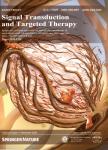Cell-type-specific memory consolidation driven by translational control
作者机构:Townsend Family LaboratoriesDepartment of PsychiatryThe University of British ColumbiaVancouverBCCanada Institute of AgingSchool of Mental Health and Kangning HospitalThe Second Affiliated Hospital and Yuying Children’s HospitalWenzhou Medical UniversityWenzhouChina
出 版 物:《Signal Transduction and Targeted Therapy》 (信号转导与靶向治疗(英文))
年 卷 期:2021年第6卷第2期
页 面:206-208页
核心收录:
学科分类:0710[理学-生物学] 07[理学] 071006[理学-神经生物学]
基 金:Q.Z.is supported by the UBC Four Year Fellowship and DMCBH Innovation Fund Graduate Trainee Award I.B.L.is supported by the UBC Four Year Fellowship.W.S.was the holder of Canada Research Chair in Alzheimer's disease
主 题:synthesis. translational stimulation
摘 要:***’s group has significantly contributed to the understanding of translational control in learning and *** a recent Nature article,they further reported the cell-typespecific translational control underlying memory consolidation.1 Long-term potentiation(LTP)has been widely acknowledged as one of the main cellular models of learning and ***,there are two components of LTP driven by different stimulations and *** early phase of LTP(E-LTP)and short-term memory(STM)are evoked for short periods and are temporary,relying primarily on modifications of pre-existing *** late phase of LTP(L-LTP)and consequent longterm memory(LTM)are elicited by strong and repetitive stimulation and are long-lasting,requiring new protein synthesis.



